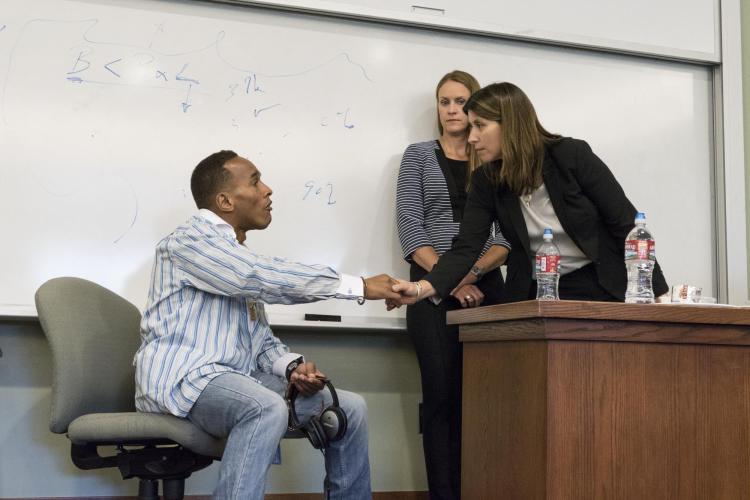Five Minutes with Kristy Martinez, Director, Korey Wise Innocence Project

What have you been up to this summer?
We have been busy creating processes to train future Innocence Project volunteers and centralize resources for attorneys working on wrongful conviction cases.
In March, I attended the national Innocence Network Conference in San Diego, where I learned about various cutting-edge scientific research and heard scientific experts discuss the current state of affairs about the reliability of types of scientific evidence. I came back super inspired and charged up. Forensics tests are more sensitive and reliable than we’ve ever seen them, which gives lawyers more options to examine innocence cases than ever before. That’s really exciting and interesting.
We’ve also been hard at work developing curriculum around wrongful convictions to inform future students and community-centered events and discussions about this important topic and its implications.
How are you building processes and systems to support the Korey Wise Innocence Project?
Over the summer we created an interactive bank of forensic resources and materials from medical and legal journals. This repository includes scientific and legal research and breakthroughs that students or attorneys studying wrongful convictions may need in their practice. While that information previously existed, it was not all in one place. I wanted that information to be stored readily available in Colorado, and I wanted the students volunteering with the KWIP to be able to explore the scientific journals behind the forensics research. It’s nice that the younger generation of lawyers are getting exposed to that before they go out into the practice.
Another summer project involved created an interactive knowledgebase/training tool to guide young lawyers through the screening and investigation process. Previously, I was spending a lot of time training student volunteers individually, and this tool allows for my time to be better allocated toward in-depth advising on cases.
How does the training tool work?
We call it the “Turbo” approach to Innocence Project institutional memory. It serves as both a database to store information about cases, scientific technologies, and findings from the President’s Council of Advisors on Science and Technology (PCAST) forensics analysis as well as a training tool to teach young lawyers to think critically about scientific evidence. When students enter information about a particular case, the system auto-generates next steps based on laws from that year and other factors. It’s a way to capture institutional knowledge, store data from previous cases, and streamline the training process for future volunteers.
Why is it important for students to understand the science behind the cases they are investigating?
Our responsibility is to not only explore older cases where forensics tests might not have been used to the best of their ability, but to prevent those types of mistakes from happening in the future. The only way we can do that is to train lawyers to responsibly look at cases and plant seeds for future lawyers to ensure they understand how to do that.
Science isn’t scary, and lawyers need to become well-versed in it in as they cut their teeth into the more intricate cases. Knowing about the scientific tools and types of evidence testing available are huge parts of being an ethical lawyer.
We are teaching competencies for how to identify and use the most cutting-edge scientific technologies available in a responsible and ethical way. You can’t have enough of that training as a young lawyer. Even if they are not the ones making the calls on a team during their first case, young lawyers are still contributing in a really meaningful way and should feel confident having those conversations about science.
What are you excited about for the fall semester?
We have already identified cases of interest that we are moving forward with in more thorough investigations. Last year, much of what we were doing was trying to identify and screen cases. This year, we are shifting resources to be able to pursue investigations more thoroughly, which I am excited about.
I will also be teaching a class on post-conviction cases this fall and a class on wrongful convictions in the spring. This will be the first time that students can earn course credit while exploring these issues. I believe this will make for sophisticated law students who can come in the office and be able to immediately dive into an investigation with minimal training. I’m looking forward to having a group of people who are ready to hit the ground running.
About the KWIP
The Korey Wise Innocence Project at Colorado Law is a full-time program that engages law students and pro bono attorneys who methodically examine and investigate claims of innocence in Colorado. When a case appears deserving of being re-litigated, the KWIP recruits private lawyers and law firms, as well as investigators and experts, to represent the individual. Learn more at colorado.edu/law/innocence.
Pictured: Korey Wise (left) and Kristy Martinez.


